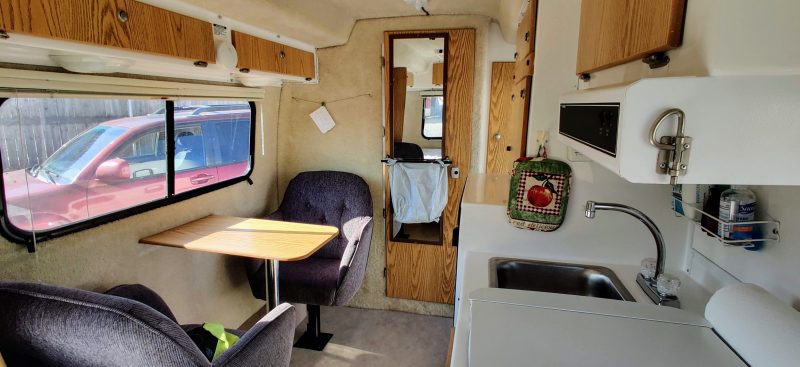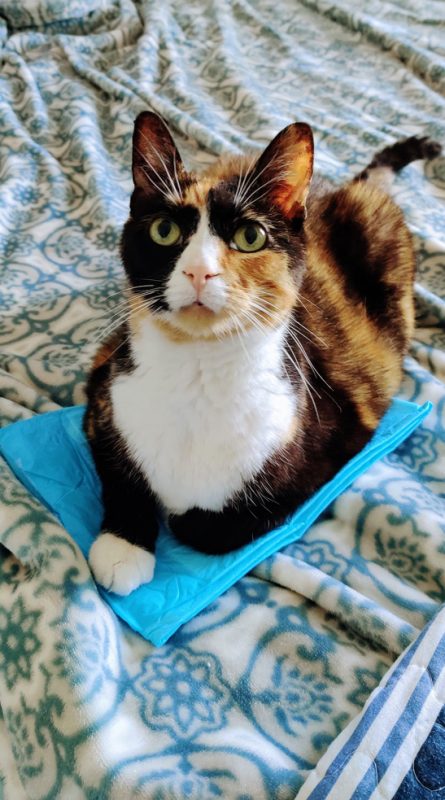Everyone told us we were crazy to try to travel with a cat in our tiny, 17′ Casita travel trailer. Dogs? Dogs are easy. But, cats are a different animal altogether — literally. (There’s a reason I put together an entire guide to traveling with a cat in a car long-distance.)
Vagabondish is reader-supported. When you buy through links on our site, we may earn a small affiliate commission. Read our disclosure.
Of all the things we had to learn with our new RV, figuring out how to safely travel with Lizzi the Travel Cat was the most stressful. After an eight-week, break-in road trip from Oklahoma to New England and back again, we learned a lot. Here’s the low-down on traveling with cats in a travel trailer (most of these tips apply to traveling with cats in a fifth wheel or popup camper too!) …
Make Sure the Tow Vehicle Is Comfortable
Because we’re traveling with a travel trailer (i.e., one that we tow, rather than drive), Lizzi travels with us in the 4Runner on travel days. Most days, she’s confined to the SUV for between two and four hours. That’s a long time for a cat to be stuck in a vehicle. So, we make sure that it’s as comfortable for her as possible. As I mentioned, I’ve written an entire post on traveling with a cat in a car because that’s worth a guide unto itself.
If you’re RV’ing with a travel trailer (meaning your cat will be with you in your tow vehicle at least some of the time), I’d highly recommend checking out that guide first, then coming back here. If you’ve already got that part of traveling with your cat sorted, carry on below …

Take It Slooow …
Cats are, of course, creatures of habit. They love the status quo: Same litter box, same bed, same food, same hoomans. So, introducing them into a completely new environment — like, say, a travel trailer — is stressful. It smells weird (to them), the layout is different than home, and EVERYTHING IS WRONG. The key is to take it slow.
Before heading out on a weeks- or months-long trip, find somewhere like a KOA or other easy, reliable campground near home for a quick overnight trip. Use it as a break-in (or “shakedown”) trip for your new travel trailer or RV. Don’t buy anything new just yet. Bring all of your cat’s usual, safe, comfortable essentials — the same litter box, their favorite toys, the typical food, etc. Don’t change a thing. Keep as much in their new environment as familiar as possible.
Introduce them to your new travel trailer, and sit with them. Pet them, speak softly to them, put on some soothing Yanni music. Reassure them that this new space is completely safe. And that everything is going to be just fine.
Thankfully, Lizzi takes to new spaces pretty quickly. So, introducing her to the Casita was surprisingly easy. Most cats, however, will probably need time to adjust. Once you feel like yours is a little more comfortable in their new digs, then it’s time to consider what new products you may need to buy to make traveling with cats in your travel trailer work for you.
Find the Right RV Cat Litter Box
Finding the right litter box for Lizzi somehow became the most challenging task about traveling in our new-to-us Casita. Cat owners with tiny travel trailers quickly realize the problem is two-fold.
First, you need a box that’s small enough to neatly tuck away somewhere in your tiny travel trailer. In our 17-foot Casita, the space is extremely limited. Because we’re keeping the rear dinette/bed combo down as a full-time bed, the total floor space is probably 30 square feet. So, our options were limited to:
- In our only storage closet: This proved unrealistic as we needed every cubic foot of that storage space. Plus, it would’ve meant Lizzi had to jump over a large (12-inch-ish), high lip to get to her box every time. The closet would also have been a trap for litter which I would’ve had to vacuum at least daily.
- In the bathroom: Also unrealistic as we didn’t want to risk cat litter getting into and clogging the RV’s shower and sensitive plumbing. Plus, frankly, there just isn’t enough room.
- Behind the forward-most captain’s chair: Because of the angle of the chair back, this wound up working great. There’s enough room behind the chair to put Lizzi’s litter box. At night, we can even slide the box out from behind the chair to give her more room to do her business.
This leads to the second and more important concern: The litter box has to be compact, yet still large enough to accommodate your kitty. If the space is too confined, it’ll stress the cat. They’ll end up not using the box at all or using it but “missing” half the time.
I should say that for travel trailer owners with average-sized cats, this may not be an issue. Most normal cats and especially kittens will have no problem using a standard litter box. Lizzi, however, is anything but “standard.” She’s a taller-than-average calico who, for whatever reason, occasionally stands in the litter box but hangs her butt over the side to do her business. Sometimes this results in pee winding up where it doesn’t belong.
Getting cat urine into the cracks and crevices and on the carpeted walls of our precious Casita literally kept me up nights. I had to find a strategy that worked.
For us, we went through three different litter boxes before finding one that worked. I can recommend all three as they’re all actually pretty good and will probably work for most cats. Unfortunately, only one worked for Lizzi.
The Best Cat Litter Box for RVs and Travel Trailers
I was this-year years old when I found out vertical-entry cat boxes were a thing. My initial reaction was, “There’s no way a cat would use that.” But, after reading reviews from tons of satisfied (and similarly surprised) cat owners who had tried one and loved it, I decided to give it a shot.
The Top-Entry or Vertical-Entry Cat Litter Box
The IRIS USA Medium Top Entry Cat Litter Box was the first one I bought. To my delight, it fit perfectly. It’s also made well and looks great — well, it looks great for a cat litter box — which made Kelsey happy. The sleek, curvy, white design blends pretty seamlessly into our travel trailer without the typical “cat box look.”
[amazon box=”B0794TLRDQ”]Sadly, Lizzi wasn’t having any of it. For a vertical-entry litter box to work properly, the cat needs to be able to jump on top of the lid, then down into the box. But, with the lid on, the inside of the box was way too small for her. She couldn’t even stand up in it. Which meant we had to take the lid off, which then meant she was skittish about jumping into it at all. Total fail.
That said, I’d still recommend this solution if you have an average-sized cat who is fine with using a lidded litter box. With the lid on, the sleek design hardly looks like a litter box. Plus, it’s fantastic at keeping litter in the box — which, if you own a small travel trailer (like a Casita or Scamp), you’re very familiar with having to constantly sweep or vacuum to keep your floor clean (more on that in a minute).
The High-Sided Litter Box
Try #2: Since the first IRIS litter box almost worked, but not quite, I decided to try another option from the company. This time, I went with the IRIS Shielded Litter Pan For Cats.
[amazon box=”B07CZGRL5S”]The white, curvy design is not quite as elegant as the first option, but it still looks better than a typical litter box. It’s also not enclosed (which Lizzi clearly hates) and the back has a higher side that, in theory, should help keep more pee in the box. Again, it also fit perfectly in the same space behind the captain’s chair.
Lizzi’s take? Nope. She would stand “backwards” in it to pee — meaning one paw on the high side with her butt toward the front — and go outside the box almost every time. Super total epic fail.
Actually, while this second option didn’t work inside the travel trailer, we decided to remove the high-backed piece and use the bottom tray as a second litter box for our tow vehicle. That way, we didn’t have to keep moving Lizzi’s one litter box between the 4Runner and Casita every time we stopped. There’s now always a litter box in each space.
I should take this aside to note that cat logic works exactly opposite of human logic. However you expect them to behave, they won’t.
The Plain Ol’ Tray-Style Litter Box
Third and final try …
Ultimately, after more hours of studying cat bathroom habits than I’d care to admit to, I learned that most cats need the extra space behind their bodies to not feel too confined in their litter box. A high-sided litter box can “scrunch” (that’s a scientific term) their tails while going to the bathroom, causing them discomfort and stress. For some, their solution is to turn around, facing their butt away from the highest side, and waste ending up outside the box.
So, in the end, the solution we decided on was a pretty standard, low-sided, tray-style model with normal proportions. I picked it up at Petsmart for less than $10. The most important component was just measuring to make sure it would fit behind the captain’s chair in our travel trailer. Lizzi’s taken to it just fine with minimal “accidents.”
If I had just done that in the very beginning without overthinking it, I probably would’ve saved myself $50 and a dozen hours of my life. But, again: cat logic.
… And Find the Right Cat Litter Too
Another thing we learned about living with our cat in a tiny travel trailer is that the RV interior can smell like cat litter very quickly. Kelsey and I aren’t down with the strong, “try-to-mask-that-odor-at-all-costs” smell of most scented kitty litters. So, we buy unscented litter to eliminate that problem.
More specifically, the small, 8.5-pound plastic jugs of Tidy Cats LightWeight Free & Clean. They’re lightweight (obviously), compact (important for anyone with limited storage in a tiny RV), and one jug contains enough litter to fill most typical cat litter boxes with a little left over.
[amazon box=”B07CWHWCJZ”]Get Pee-Pee Protection in Place for Your RV

One product that’s helped me keep my sanity is puppy pee pads. I stumbled across these on a visit to Petsmart, and they’ve been a godsend. I pin one pad to the wall (the walls are covered in carpet in our Casita) using drapery hooks, then Gorilla Tape a second pad to the floor underneath her litter box.
She mostly — mostly — gets everything in the box now that we found the right one. But, on the rare occasions when she misses, the pee pads catch any excess. Once they get dirty, I simply toss and replace.
Scoop the Cat Box in Your RV Often
I’ve read some people go a week (or more?) without scooping their cat’s litter box. Frankly, that sounds disgusting to me. But, I don’t want to judge …
I’ll just say that, if you’re traveling in an RV or travel trailer with a cat, you’re going to want — even need — to scoop the litter box every day.
Smells accumulate fast in an RV. Particularly if you’re traveling in extreme heat or cold without the opportunity to open the windows, it can get stinky very quickly. So, for your sake — and your kitty’s! — scoop their litter box often.
Change Your Cat’s Water Often
We change Lizzi’s water often at home. But, in the Casita, we found that her water bowl collects bits of dirt and dust much faster than at home. With the three of us constantly moving around, and we humans going in and out of the trailer often, there are a lot more particulates in the air. So, we change out her water and rinse the bowl at least daily, sometimes more if it calls for it.
As an aside, it’s worth noting we only give her water from the same source we drink from. In our case, we don’t drink water that’s passed through the Casita’s plumbing (not necessary, but it’s our preference). We only drink water that’s been filtered at the spigot using a Culligan RV water filter.
[amazon bestseller=”cat calming” items=”1″]Sweep Your Travel Trailer Daily
In an RV — especially in a small travel trailer — cat litter will get everywhere. Even with a vertical-entry or high-sided litter box, there’s just no way around this fact.
I got in the habit of sweeping the entire floor of our travel trailer every morning. It’s so small that, even with a tiny hand broom and dustpan, it takes less than two minutes.
… And Vacuum Too
You probably won’t need to vacuum daily. But, cat litter has a way of getting into every nook and cranny, especially in places where a broom and dustpan just can’t reach. We found our household Shark Rocket Corded Bagless Stick Vacuum to be perfect for traveling with. We’ve actually owned this model for a couple of years.
What’s great about it is that we take only the main body of it with us and leave all of the accessories and other bits at home. It’s affordable, lightweight, ultra-compact, and plenty powerful enough to clean the Casita in just a couple of minutes.
[amazon box=”B00EUKHACW”]Keep a Close Watch on Your Fur Baby (or “How to Keep Cats from Escaping RV”)
Traveling and living in such a small space means our cat is always within just a few feet of the front door. If she wants to escape, it’s a quick hop or two to freedom.
Thankfully, Lizzi is perfectly happy indoors. She’s an indoor cat at home and doesn’t have much interest in straying too far from her always full food bowl and a soft, warm bed. Still, we spent the money (I think it was less than $50) to get her microchipped. It’s a small price to pay to ensure that, if she does get out, we have a good chance of finding her.

Of course, if your kitty has a knack for trying to escape, that’s a whole new worry. When we were on the road in our travel trailer, I always made sure to check where Lizzi was whenever I was going in and out of the trailer. If she was resting or asleep in a chair or on our bed (really, it’s her bed), I was confident I could safely go in and out of the trailer. But, I never just assumed where she was.
The same goes for closing the front door — I never assumed it was shut after leaving the RV. I would always push it closed, listen for the click, and push it again. Check and double-check. When you’re on the road, going in and out of the trailer at camp dozens of times a day, it’s easy to get lax about assuming the door is shut. It only takes a few seconds for your curious kitty to learn that it isn’t and make a break for it. Whenever you’re reentering your travel trailer, open the door slowly to make sure they’re not right on the other side waiting to bolt. Of course, a screen door is a big plus here.
One final tip: Keep a current photo of your cat on your phone. This shouldn’t be a problem for most cat owners who tend to take more photos of their kitties than of their kids. In the event yours ever wanders off, you can show the photo to other campers, campground owners, etc. to help you find them.
So, that’s about it. After a lot of trial and error, it seems we have a good system for traveling with a cat in our travel trailer. Probably … maybe. I know we’ll learn more as we go.
Are you an RV or travel trailer owner with a cat? What are your tips for traveling with your cat and keeping them happy, healthy, and safe along the way? Kelsey and I would love to hear your thoughts!


